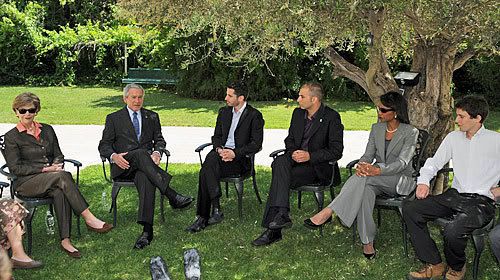
""I don't think he's so popular with young people in America," said Aviad Tamir, 25. "But from us he received a lot of warmth."
Near the end of his Israel visit, the president has an informal chat with a group of Jewish and Arab students. A frank and lively discussion results.
By Richard Boudreaux, Los Angeles Times Staff Writer
6:54 PM PDT, May 16, 2008
JERUSALEM -- Seated under an olive tree with a dozen Israeli students, President Bush was bemoaning the bad rap he gets in the Middle East. Many people believe he hates Muslims, he said, but it's not true.
It was as friendly an audience as Bush could expect in this part of the world, so Henriette Chacar's comeback gave him pause. "I think it comes out that you don't like Muslims because in most of your speeches you tend to relate extremism to Muslims," said the 16-year-old Israeli Arab, who is Christian.
Without bristling, Bush conceded the point.
"Actually, what I say is you're not a religious person if you're a murderer," he replied. "But you're right. I've got to do a better job of making it clear when I talk about Islam [that] I talk about a peaceful religion."
The exchange Friday was part of an unusually frank and lively discussion between an unscripted Bush and a diverse group of young Israelis as he ended a 48-hour visit to Israel. It showed a reflective, self- critical side of a leader in his final year in office, but also a gap in his awareness of the rigid social norms that underlie the region's conflict and reinforce division.
At one point, Bush asked whether Arabs and Jews date, or go to the same dances.
"No dances?" he asked, sounding surprised by the answer.
Then he glanced at 17-year-old Jonathan Blumenfeld, who had spoken about his music, and joked: "You should get him to take out his guitar. How much reconciliation there would be on the dance floor."
Manar Saraia put the issue to rest. It's unusual that she has Jewish roommates, but the 22-year-old Israeli Arab Muslim told Bush that her family would not approve if she dated or married a Jew.
"The parents and the children themselves think if we are of different religions that it's hard to live together as a couple," she said.
Bush conversed easily with the students as he sat with them in a circle of wrought iron chairs on the lawn of the Bible Lands Museum. First Lady Laura Bush and Secretary of State Condoleezza Rice joined them.
The student group, representing schools selected by the U.S. Embassy, was a mosaic of native-born Jews, Jewish immigrants from Ethiopia, Argentina and the former Soviet Union, and the two Arab Israeli citizens, members of a minority in Israel that often identifies with Palestinians in the neighboring West Bank and Gaza Strip. They included high school, university and postgraduate students.
Bush had come to Israel to help celebrate the 60th anniversary of the country's founding. And despite little to show for six months of U.S.-backed peace talks, he has pressed at every stop the goal of a partial accord by the end of his presidency, one that would lead to a Palestinian state alongside Israel.
He found support for compromise under the olive tree, where Ron Hasid, a 16-year-old Orthodox Jew, declared that he was willing to give up land to the Palestinians "so they get a good life too." Assaf Irony, 27, called for more cultural programs to bring Israelis and Palestinians together.
But though they shared some of Bush's optimism about peace, the students kept trying to bring his expectations to Earth.
Mor Tzaban, 18, said it is hard to be hopeful when Palestinian rockets fired from Gaza keep landing on her town in the Negev desert. Danny Glushenkov, 26, said Hamas, the militant Islamic group running Gaza, "is the main obstacle."
"Optimism doesn't mean ignoring the truth," Bush replied. Later he said, "I think why people are fighting is there's a group of people that refuse to accept a Jewish state . . . a refusal to admit a certain reality."
That brought a fresh retort from Chacar, the Arab teen, who said Israel for too long had refused to recognize the Palestinians' identity and rights.
"We can't wipe out a whole section of history," she said. "The Palestinian people did exist."
"Did exist and do exist," Bush answered, forecasting a Palestinian state. "It's going to happen."
The president went around the circle for 45 minutes, giving each Israeli a chance to speak. When Aviad Tamir, 25, said he aspired to a public service career and asked for advice, Bush said, "You don't have to lose your soul. . . . Have a core set of principles that you won't change."
Bush left a good impression.
"I don't think he's so popular with young people in America," Tamir said. "But from us he received a lot of warmth. You could tell he enjoyed it."
Even Bush's young Arab critic gave him a thumbs-up.
"He accepted my criticism. He didn't make me feel out of place," said Chacar, who last year served as Israel's ambassador to a high school Model United Nations assembly. "Communication is the key to solving this conflict. To have him communicating with us, it gave us some hope."
boudreaux@latimes.com

0 comments:
Post a Comment